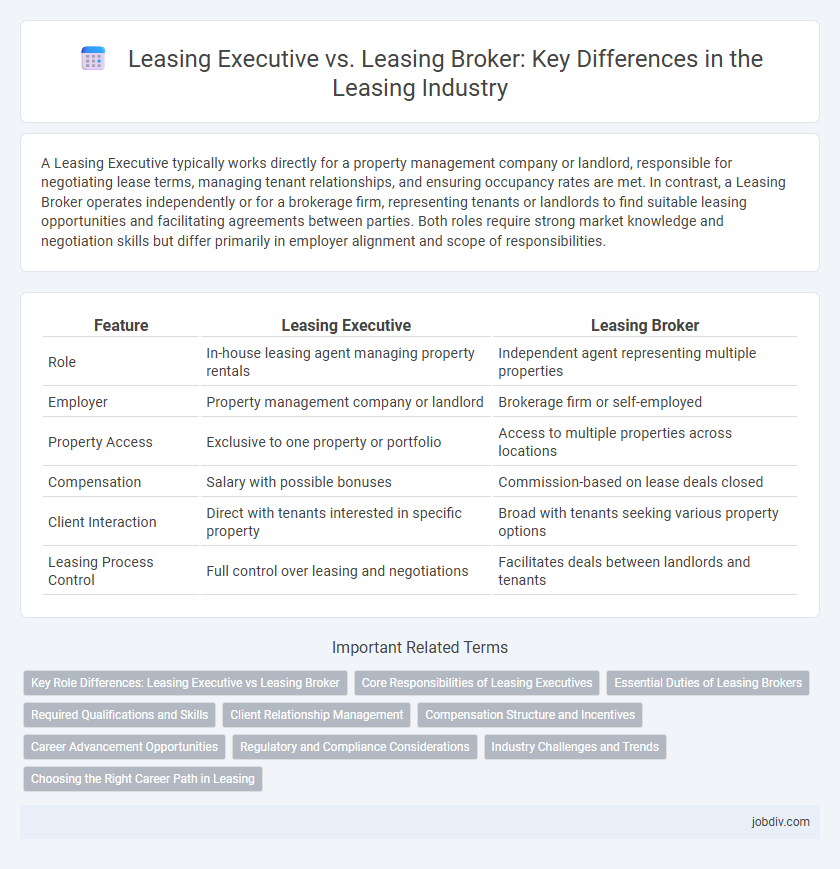A Leasing Executive typically works directly for a property management company or landlord, responsible for negotiating lease terms, managing tenant relationships, and ensuring occupancy rates are met. In contrast, a Leasing Broker operates independently or for a brokerage firm, representing tenants or landlords to find suitable leasing opportunities and facilitating agreements between parties. Both roles require strong market knowledge and negotiation skills but differ primarily in employer alignment and scope of responsibilities.
Table of Comparison
| Feature | Leasing Executive | Leasing Broker |
|---|---|---|
| Role | In-house leasing agent managing property rentals | Independent agent representing multiple properties |
| Employer | Property management company or landlord | Brokerage firm or self-employed |
| Property Access | Exclusive to one property or portfolio | Access to multiple properties across locations |
| Compensation | Salary with possible bonuses | Commission-based on lease deals closed |
| Client Interaction | Direct with tenants interested in specific property | Broad with tenants seeking various property options |
| Leasing Process Control | Full control over leasing and negotiations | Facilitates deals between landlords and tenants |
Key Role Differences: Leasing Executive vs Leasing Broker
A Leasing Executive primarily manages lease agreements, oversees property marketing, and maintains tenant relationships within a company's portfolio, ensuring consistent occupancy rates and lease compliance. In contrast, a Leasing Broker operates as an independent agent representing landlords and tenants to negotiate lease terms, leveraging a broad network to facilitate property transactions. Key role differences include the Leasing Executive's internal focus on property management and tenant retention versus the Leasing Broker's external client acquisition and deal negotiation responsibilities.
Core Responsibilities of Leasing Executives
Leasing Executives primarily manage tenant relations, oversee lease agreements, and coordinate property showings to maximize occupancy rates. They collaborate closely with property management teams to ensure compliance with leasing policies and maintain high tenant satisfaction. Their responsibilities also include negotiating lease terms, processing applications, and addressing tenant concerns to facilitate smooth leasing operations.
Essential Duties of Leasing Brokers
Leasing brokers primarily focus on connecting tenants with suitable rental properties by leveraging market knowledge and client networks to negotiate lease terms that benefit both parties. Their essential duties include marketing properties, conducting property showings, screening applicants, and facilitating lease agreements, ensuring compliance with legal and regulatory standards. Unlike leasing executives who often work directly for property owners, leasing brokers act as intermediaries, providing unbiased options and personalized services to tenants and landlords.
Required Qualifications and Skills
Leasing Executives typically require strong sales experience, excellent communication skills, and a deep understanding of property management and leasing regulations, often supported by a degree in business or real estate. Leasing Brokers must possess licensing credentials, robust negotiation abilities, and comprehensive market knowledge to effectively represent clients and close deals. Both roles demand proficiency in customer relationship management and a strategic approach to maximizing occupancy rates and rental income.
Client Relationship Management
Leasing Executives typically manage client relationships by working directly with property owners and tenants to negotiate lease terms and ensure satisfaction throughout the leasing process. Leasing Brokers act as intermediaries, connecting clients with available properties while maintaining strong communication to fulfill both parties' needs efficiently. Effective client relationship management in leasing emphasizes personalized service, prompt responsiveness, and clear contract guidance to foster long-term partnerships.
Compensation Structure and Incentives
Leasing executives typically receive a fixed salary combined with performance-based bonuses tied to lease renewals and tenant retention, incentivizing long-term property occupancy. Leasing brokers often work on a commission basis, earning a percentage of the lease value or a flat fee per transaction, motivating swift lease closures. The distinct compensation structures align executives with portfolio stability while brokers focus on volume-driven results.
Career Advancement Opportunities
Leasing Executives often experience structured career advancement within property management firms, progressing to roles such as Leasing Manager or Regional Director by leveraging internal training programs and company networks. Leasing Brokers typically benefit from a flexible career path, expanding their client base and commission potential across multiple property types, which can lead to entrepreneurial ventures or senior brokerage positions. The choice between the two influences access to mentorship, income scalability, and professional growth within the real estate leasing industry.
Regulatory and Compliance Considerations
Leasing executives typically operate within a company and must adhere to internal compliance standards and relevant housing laws to manage lease agreements effectively. Leasing brokers, acting as intermediaries between landlords and tenants, navigate a complex regulatory environment that includes licensing requirements, fair housing laws, and fiduciary duties. Both roles require thorough knowledge of local and federal regulations to ensure legally compliant transactions and avoid potential liabilities.
Industry Challenges and Trends
Leasing Executives face challenges in adapting to digital transformation and evolving tenant expectations, requiring strategic oversight in portfolio management and market analysis. Leasing Brokers encounter increasing competition and demand for specialized market knowledge while navigating complex regulatory environments and client negotiation processes. Both roles must integrate data-driven insights and sustainability trends to remain competitive in the dynamic leasing industry landscape.
Choosing the Right Career Path in Leasing
Leasing Executives typically work directly for property management companies, focusing on leasing residential or commercial spaces while managing client relationships and ensuring occupancy rates. Leasing Brokers operate independently or within brokerage firms, specializing in connecting tenants with landlords across multiple properties, often earning commissions from successful leases. Choosing the right career path depends on preferences for steady employment and company benefits as a Leasing Executive versus flexibility and potentially higher earnings as a Leasing Broker.
Leasing Executive vs Leasing Broker Infographic

 jobdiv.com
jobdiv.com